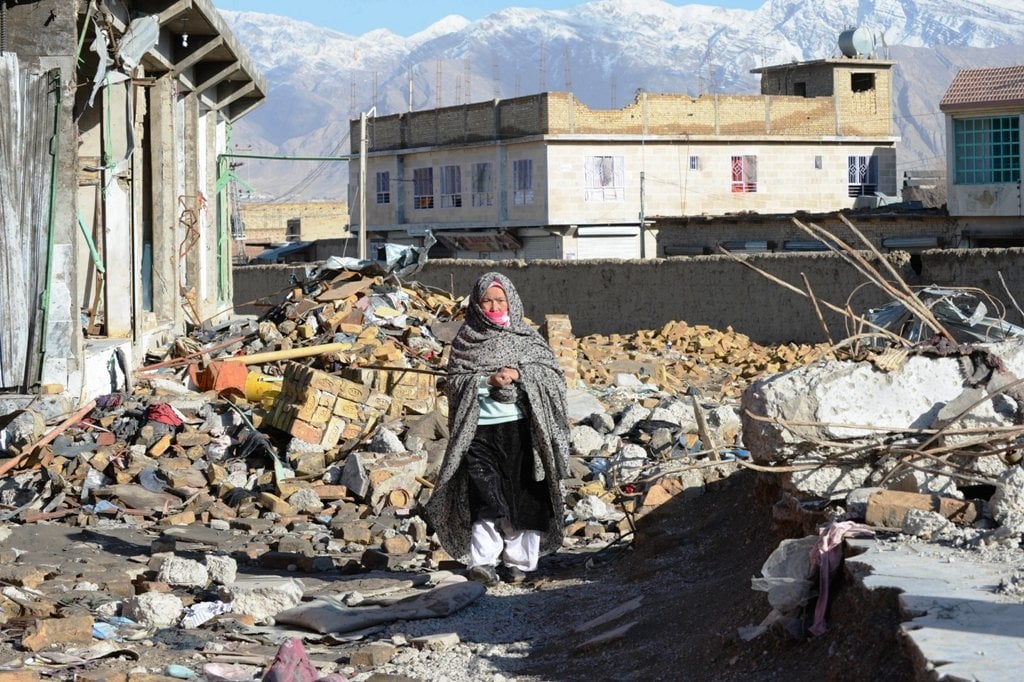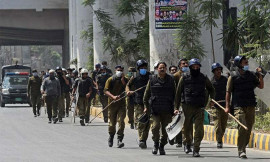
Extremist bombers killed nearly 200 people in Quetta in the two worst bomb attacks to strike Shia Muslims from the minority Hazara community, just weeks apart on January 10 and February 16.
After each attack, thousands of Hazaras, including women and children, camped out in the bitter cold demanding that the army step in to protect them. The government brokered an end to the protests, but refused to mobilise the troops.
Outlawed extremist group Lashkar-e-Jhangvi (LeJ) claimed responsibility and has threatened to exterminate all Shias. Few believe that dozens of men rounded up after the bomb attacks will ever be brought to justice.
The Supreme Court and rights groups accuse the authorities of failing to protect Hazaras and now young men like 18-year-old Ismatullah are taking up arms to defend themselves and their families.
Ismatullah's best friend was shot dead last June near Hazara Town. He lost more friends when suicide bombers flattened a snooker hall on January 10 and a massive bomb hidden in a water tanker destroyed a market on February 16.
"I couldn't control myself when I saw scattered pieces of so many children and women of our community," said the first year college student.
"Our community is only interested in education and business, but terrorists have forced us to take up whatever arms we have and take to the streets for our own security."
At the moment they operate as volunteers under the name, Syedul- hohada Scouts, registered as part of the Balochistan Scouts Association, an affiliate of the worldwide scouting movement.
For years, young men like Ismatullah have volunteered to protect sensitive events, such as religious processions during the holy month of Muharram.
But their chairman says the threat is now so great that they should be paid full time as an auxiliary to government security forces.
"We have around 200 young men who perform security duties on specific occasions, but most of them are students and workers, and can't work full-time," said Syed Zaman, chairman of the Hazara Scouts.
"We are trying to make a system to start their salaries for permanent deployment and also coordinate with the security agencies. Hopefully, we will be able to form a regular force... and salaries in a month," he said.
Scouts president Ghulam Haider said it was a mistake to rely on government security when the first of two suicide bombers struck at the snooker hall in the Alamdar Road neighbourhood.
"It resulted in another bomb blast minutes after the first one and we lost many more people," Haider told AFP.
"We didn't want that to happen again, so immediately after the blast on February 16, we armed our youth to man the streets and entry points, which helped to prevent the chances of a second attack," he claimed.
Hazara Town, where the market was bombed, is very exposed, in the shadow of the Chiltan mountains and near the bypass which links the Afghan border town of Chaman to Karachi.
While paramilitary Frontier Corps and police patrol the main approaches, they are not visible inside the neighbourhood.
"Security agencies can't protect us. They don't know the area because most of them come from outside Quetta. So we're planning to set up our own permanent posts inside our areas," said Haider.
The police, however, have their doubts.
"If we start private policing by arming one particular community, it will set the wrong precedent," said Fiaz Ahmed Sunbal, head of Quetta police operations.
He claimed police were planning to close entrances to Hazara Town, and would recruit 200 young Hazaras to patrol their own areas.
Haider says closing off roads will isolate the community but welcomed the recruitment of Hazara Scouts as a long-term solution.
Others warn that time is running out.
"If they don't do anything and something happens again, we will take up guns and go out and kill our opponents. There will be open war," said 26-year-old shopkeeper Zahid Ali.
COMMENTS (21)
Comments are moderated and generally will be posted if they are on-topic and not abusive.
For more information, please see our Comments FAQ
1672385156-0/Andrew-Tate-(1)1672385156-0-405x300.webp)
















@Hyamayun
Yes
Is this really the way forward ?
@Jkpakistani: SO, you say this reaction "could be funded by Iran or India"!!! Are you sure that Martians or KFC is not also involved? Or maybe the Sudanese National Cricket Team, you just never know!!! The ONLY thing we know is that this "reaction" is because of Muslims killing Muslims!
Everyone who picks up arms does for a valid and justifiable reason (include the Taliban). The problem is, after some time, the priority changes. People start justifying the violence they cause and start loving the power they have. So, as much as you can justify the arms, the end result will be more bloodshed, and there is no going back.
Well, We need to careful with this reaction as this could be funded by Iran or India? The sentiments are real and the issue need to be addressed as soon as possible. The enemies have been trying to create panic for quite a while however it need to hadles properly and justice needs to be provided.
@Hasan:
What are they to do?
At what point do you continue to put your trust in such a government establishment or security services. As cold as it is, a majority Sunni Pakistani population don't have as much urgency in tackling extremists groups to protect minorities, and those martyrs who did try to, like former MQM MPA Syed Manzar Imam or ANP leader Bashir Bilour (whose own brother who tried to gain favour pandered to the Taliban), were eventually killed.
@Hazara Guy. Just know that Shia across the globe are with you. Most importantly Allah is with you. InshaAllah things will get better and these terrorists will be defeated.
Thanks everyone for showing us your kind support. We must stop this terrorism by our own otherwise its gonna spread to the whole country.
What is the government there for? I am a Shia, but I oppose our slide into this potential vigilantism?
Picking up arms in self defense is most welcomed.
Government and agencies should help out the Hazara now more then ever. These people are always hard working and civil people. Its time they equip them with weapon and they can help government protect the civilians better. To be honest, I wouldn't want this kind of a job but I understand the situation they are in.
Sadly, that's what a terrorist exactly wants, to provoke a violent response so that he can raise his game to the next level and justify his violence. Now, the progressive minded youth will have a seed of violence planted in their minds and as it grows, they will be weaned away from education and dragged into the quagmire of mindless violence. Only solution is a strong response from government and that's not going to happen. This won't end nice I'm afraid.
Grave and alarming situation for government when people come out for self defence.
Good going !!!! All must have weapons ...
Good. Stop crimes, shoot back.
The concern & reaction of the community is right and legitimate. They have every right to defend themselves against the cruelty of terrorists.
When the government shall not protect the nation then the nation shall take up weapons for its protection.....
good move. but dont share ur safety plans with security agencies.........u know what they will do.......
Good step, so now we have local police patrols
What are the poor Hazaras supposed to do . they did what came naturally. I second this act of putting up defences and not relying on the so called security forces to defend them.